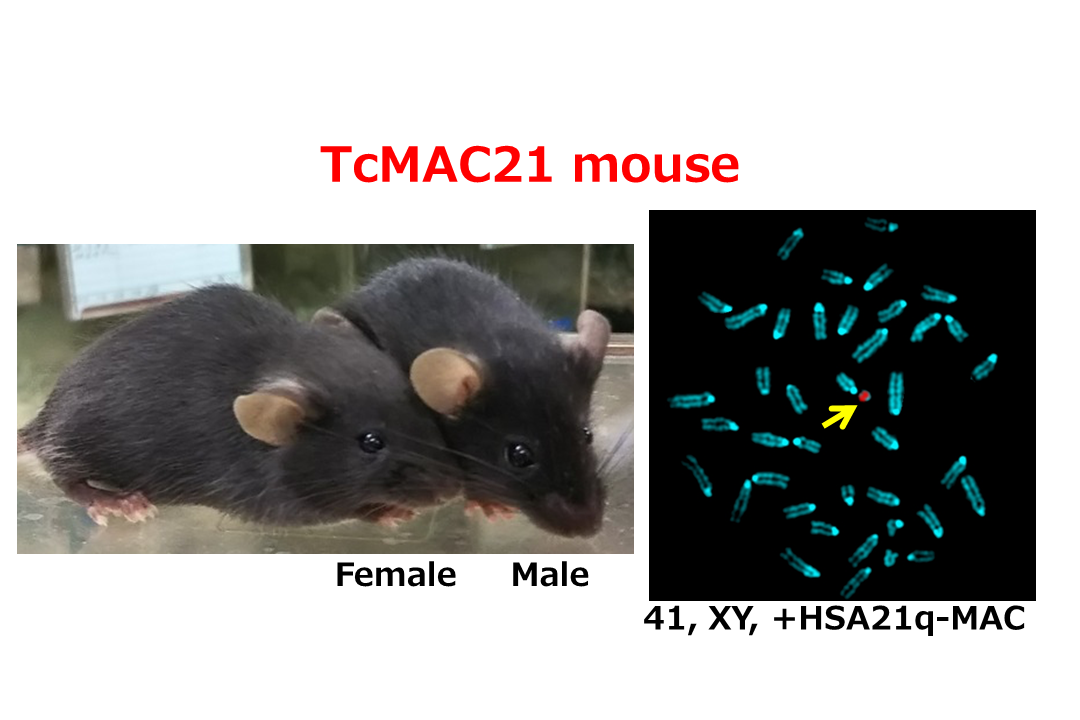 |
March 2021 Mouse of the Month |
|
A novel Down syndrome mouse model by chromosome engineering technique
STOCK Tc(HSA21q-MAC1) (RBRC05796)
|
|
Down syndrome is a congenital chromosome abnormality, which is caused by trisomy human chromosome 21. It occurs at a high frequency (1/600〜1/800) in live births. Although patients with Down syndrome tend to show characteristic physical and mental features in common, the relationship between responsible genes and pathology have not been elucidated and the effective treatment protocols have not been established yet. Until now, to improve these aspects, multiple Down syndrome mouse models were produced. However, these conventional strains were insufficient as disease models in terms of the number of trisomic genes and the status of mosaicism. Depositor (Dr. Kazuki) and his colleagues established a novel Down Syndrome model TcMAC21 strain (RBRC05796) by MAC (Mouse Artificial Chromosome)[1]. Chromosome engineering technique via MAC is enable to introduce arbitrary Mb-sized DNA fragments into host cells independently, stably and longitudinally[2]. In the case of this strain, mouse ES cells containing HSA21q-MAC (MAC with a nearly complete long arm of human chromosome 21) were utilized. In vitro genomic analysis of TcMAC21 mice revealed the freely and stably segregation of HSA21q-MAC, the near complete trisomy of protein coding genes on human chromosome 21 (about 93%) and the undetectable mosaicism in a board spectrum of tissues and cell types. In aspects of in vivo phenotypic analysis, TcMAC21 mice showed high rate of the congenital heart defects such as ventricular septal defect, the abnormal brain morphometric phenotypes such as cerebellar hypoplasia, the abnormal craniofacial skeleton, the hematological abnormalities and the learning and memory deficits. Thus, TcMAC21 strain is a useful Down syndrome model not only for pathogenic mechanism research but also for drug or therapeutic development. In addition, MAC-based chromosome engineering technique will offer the opportunity to generate advanced next generation human disease mouse models. |
| Depositor | : | Yasuhiro Kazuki, Ph.D. Chromosome Engineering Research Center, Tottori University |
|
| Strain name | : | STOCK Tc(HSA21q-MAC1) | |
| RBRC No. | : | RBRC05796 | |
| References | : | [1] | Kazuki Y, Gao FJ, Li Y, Moyer AJ, Devenney B, Hiramatsu K, Miyagawa-Tomita S, Abe S, Kazuki K, Kajitani N, Uno N, Takehara S, Takiguchi M, Yamakawa M, Hasegawa A, Shimizu R, Matsukura S, Noda N, Ogonuki N, Inoue K, Matoba S, Ogura A, Florea LD, Savonenko A, Xiao M, Wu D, Batista DA, Yang J, Qiu Z, Singh N, Richtsmeier JT, Takeuchi T, Oshimura M, Reeves RH. A non-mosaic transchromosomic mouse model of down syndrome carrying the long arm of human chromosome 21 Elife. 2020 Jun 29;9:e56223. |
| [2] | Takiguchi M, Kazuki Y, Hiramatsu K, Abe S, Iida Y, Takehara S, Nishida T, Ohbayashi T, Wakayama T, Oshimura M. A novel and stable mouse artificial chromosome vector ACS Synth Biol. 2014 Dec 19;3(12):903-14. |
||
| March 2021 Saori Mizuno, Ph.D. Contact: Experimental Animal Division, RIKEN BioResource Research Center (animal.brc@riken.jp) All materials contained on this site may not be reproduced, distributed, displayed, published or broadcast without the prior permission of the owner of that content. |





